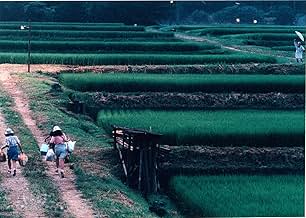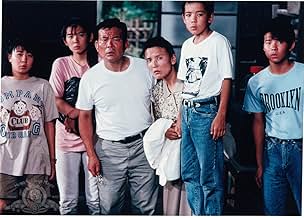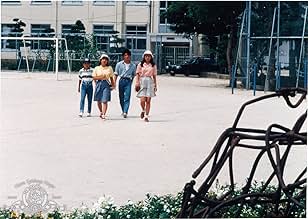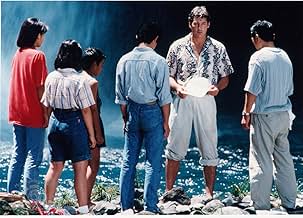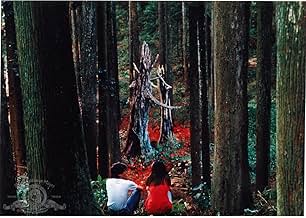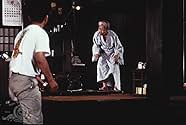VALUTAZIONE IMDb
7,2/10
7916
LA TUA VALUTAZIONE
La risposta di tre diverse generazioni alla bomba atomica di Nagasaki.La risposta di tre diverse generazioni alla bomba atomica di Nagasaki.La risposta di tre diverse generazioni alla bomba atomica di Nagasaki.
- Regia
- Sceneggiatura
- Star
- Premi
- 5 vittorie e 7 candidature totali
Richard Gere
- Clark
- (as Richâdo Gia)
Mieko Suzuki
- Minako
- (as Mie Suzuki)
Recensioni in evidenza
I am a great fan of Kurosawa and I was so shock how bore this film was when I first saw it in theatre back in the 90s. I know Kurosawa always hide some message in his late movies and, after twenty years, I decided to rent the DVD again to examine the movie in detail. As I got into the movie, I start to understand what Kurosawa want to say. This movie is about how the younger Japanese are abandon their own culture and at the same time,ironically, it is the American, the one who dropped the atomic bomb in Japan,are reviving the Japanese tradition culture(G.Lucus and S. Spielberg are the one who produced the movie Kagamusa). Also, it is about aging as Kurosawa is part of the aging generation. Old people are being seen by young people as weak, illusions, and hopeless out of time and a burden, but when crisis came,(the storm in the movie) old people would show a trendous strength to protect the young one as the old lady in the movie standing up to the storm; it reflected that even Kurosawa, an old man, still could produces such thoughtful movie. I believe Kurosawa made this movie only for those who understand him and ,to me, this is one of his best even thought I love samurai movies.
Akira Kurosawa is one of my very favorite filmmakers. If you search through my reviews, I have written about a few, The Seven Samurai, High and Low, Kagemusha, and Dreams. I have seen many more, Rashomon, Ikiru (my personal favorite), Yojimbo, Sanjuro, Dersu Uzala, and Ran. I have only disliked one, High and Low, but not one of his films failed to amaze me in some way or other. My initial opinion, after seeing Rashomon, The Seven Samurai, Yojimbo, Ran and Kagemusha was that he was an amazing stylist whose films felt slightly impersonal to me. I strongly disagree with that opinion now (I expressed it in my review to Kagemusha, which I'm surprised hasn't resulted in tons of hate mail).
I have just finished watching Kurosawa's second to last film, Rhapsody in August. It is not highly regarded, usually dismissed as a very minor work in a master's portfolio. This I also discovered about my second favorite of his films, Dreams. Well, as far as my opinion, I think people were dead wrong about both of these films.
Rhapsody in August is not a stylistic masterpiece like The Seven Samurai, Yojimbo, or Ran. Instead, only second to Ikiru, it is Kurosawa's most humanistic film. I have only seen one film by him (although I've read a lot about him), but I would compare it more to Yasujiro Ozu's work.
This film has a plethora of themes, ranging from the effect of the H-Bomb on both the Japanese and the Americans, the generation gaps between the three generations present (the matriarch of the family feels separate from her middle-aged children, but she relates well to her grandchildren who are interested in their country's sorrowful history), and the effect of American culture on the Japanese of the present generation. It is quite a handful, but everything is handled so subtly that some viewers who don't pick up on it all may easily grow uninterested. In some ways, the film feels very didactic (in a good way). I can imagine this film being showed to younger children, since the four grandchildren, at least at the beginning, are learning about the history of the bomb and Nagazaki and their grandfather's death.
The only weak point of the film is probably the very end, which is difficult to understand. I have a feeling that there was some cross-cultural barrier preventing my understanding of it, so if anyone does get it, please contact me. Anyway, as I perceived it, the film ended kind of randomly. But still, what has come before is too good to get too upset by the lack of closure. It deserves a 10/10.
I have just finished watching Kurosawa's second to last film, Rhapsody in August. It is not highly regarded, usually dismissed as a very minor work in a master's portfolio. This I also discovered about my second favorite of his films, Dreams. Well, as far as my opinion, I think people were dead wrong about both of these films.
Rhapsody in August is not a stylistic masterpiece like The Seven Samurai, Yojimbo, or Ran. Instead, only second to Ikiru, it is Kurosawa's most humanistic film. I have only seen one film by him (although I've read a lot about him), but I would compare it more to Yasujiro Ozu's work.
This film has a plethora of themes, ranging from the effect of the H-Bomb on both the Japanese and the Americans, the generation gaps between the three generations present (the matriarch of the family feels separate from her middle-aged children, but she relates well to her grandchildren who are interested in their country's sorrowful history), and the effect of American culture on the Japanese of the present generation. It is quite a handful, but everything is handled so subtly that some viewers who don't pick up on it all may easily grow uninterested. In some ways, the film feels very didactic (in a good way). I can imagine this film being showed to younger children, since the four grandchildren, at least at the beginning, are learning about the history of the bomb and Nagazaki and their grandfather's death.
The only weak point of the film is probably the very end, which is difficult to understand. I have a feeling that there was some cross-cultural barrier preventing my understanding of it, so if anyone does get it, please contact me. Anyway, as I perceived it, the film ended kind of randomly. But still, what has come before is too good to get too upset by the lack of closure. It deserves a 10/10.
This film feels like a story the great Akira Kurosawa wanted to tell. Four grandchildren are staying with their aged grandma outside of Nagasaki. She is a survivor of the bomb in 1945, but her husband, a teacher, perished that day. The grandmother's children are in Hawaii visiting a relative and her husband, who is played by Richard Gere in a fine understated performance. Clark (Gere) and his wife have her father living with them, and they claim he is one of Grandma's brothers, but she cannot remember him. The film becomes a mediation on the war, specifically the devastating effect on Nagasaki. In one particularly touching scene everyone gathers at the school where Grandpa perished that day in August. There is a monument there built for the children who dies there that day, a sculpture of mangled monkey bars. The film is slow moving, meditative, but moving in its best moments. While not among Kurosawa's best work (its virtually impossible to stand up to such greatness), this last film of his is a touching tribute to a part of his life (and so many others) that is both easy to forget, but also impossible not to remember. The acting is uniformly very good, especially the four children and Grandma. Recommended.
Although aware of Akira Kurosawa's standing in the realm of world cinema,I have never been a great fanatic of his films as most of them are Samurai films heavily laden with symbolic references to Japanese society.For me Akira Kurosawa's non Samurai films are better films as they speak of deeper issues like human sentiments.I watched "Rhapsody in August" directed by Akira Kurosawa film with rapt attention.As I was watching it after having watched "Madadayo",I could not help but comparing it both in style as well as content with that film.Both the films were made by Kurosawa when he was at the end of his career and may be for this reason he chose to make humanist stories.Rhapsody in August is a meaningful tale for all people whether they are young or old,American or Japanese.It is a film which shows how important a family is and how wisdom must be passed from the old to the young. Kurosawa has deftly tackled the question of Japan's Atomic bomb tragedy through plain words spoken by an old lady who tells her young grandchildren that with the passage of time all wounds are healed.Rhapsody in August tells us albeit in a non academic manner why it is important to live peacefully thereby avoiding war for the benefit of peaceful coexistence and human society.
"Rhapsody in August" (1991) is Akira Kurosawa's next to last film. It belongs to Kurosawa's final period of film-making when he moved away from themes such as samurai stories and historic eras of Japan and focused on issues such as the Second World War and its effect on the lives of ordinary people in Japan. The title of this film is a reference to August 9, 1945, when the atomic bomb fell on Nagasaki.
"Rhapsody in August" tells the story of four young girls and boys who visit their grandmother in a village near Nagasaki for their summer vacation. She is one of the survivors of the atomic bomb fell on Nagasaki during the war but she lost her husband in the atomic bomb attack. It is through her that her grandchildren learn about the atomic bomb attack and how it killed their grandfather. The children's parents have gone to Hawaii to visit the grandmother's elder brother, who had married an American woman and lived there since then.
The film shows how the children's indifference and disrespect for their grandmother gradually turns into understanding and respect for the sufferings she has gone through. We are allowed to explore the Nagasaki catastrophe through the grandmother's point of view and its aftermath through the children's view, who come to show much more understanding for the catastrophic event than their parents, who only seem to care about not raising the issue of the atomic bomb on fear that it might upset their American relatives and deprive them from their enterprise.
Although the film, in several occasions, makes direct criticism against the US over the Nagasaki atomic bomb attack, it is mostly through the grandmother's powerful and vivid recollections of the war, and the children's understanding of the events, that the depth of people's sufferings and the cruelty of the act -- the atomic bomb attack -- are seen. One great example is when the grandmother compares the mushroom cloud of the atomic bomb to a great eye watching over the city.
The grandmother is the living soul of all the pains caused by the atomic bomb and Kurosawa, all through the film and particularly in its iconic ending, well reminds us that time might not heal all wounds.
"Rhapsody in August" tells the story of four young girls and boys who visit their grandmother in a village near Nagasaki for their summer vacation. She is one of the survivors of the atomic bomb fell on Nagasaki during the war but she lost her husband in the atomic bomb attack. It is through her that her grandchildren learn about the atomic bomb attack and how it killed their grandfather. The children's parents have gone to Hawaii to visit the grandmother's elder brother, who had married an American woman and lived there since then.
The film shows how the children's indifference and disrespect for their grandmother gradually turns into understanding and respect for the sufferings she has gone through. We are allowed to explore the Nagasaki catastrophe through the grandmother's point of view and its aftermath through the children's view, who come to show much more understanding for the catastrophic event than their parents, who only seem to care about not raising the issue of the atomic bomb on fear that it might upset their American relatives and deprive them from their enterprise.
Although the film, in several occasions, makes direct criticism against the US over the Nagasaki atomic bomb attack, it is mostly through the grandmother's powerful and vivid recollections of the war, and the children's understanding of the events, that the depth of people's sufferings and the cruelty of the act -- the atomic bomb attack -- are seen. One great example is when the grandmother compares the mushroom cloud of the atomic bomb to a great eye watching over the city.
The grandmother is the living soul of all the pains caused by the atomic bomb and Kurosawa, all through the film and particularly in its iconic ending, well reminds us that time might not heal all wounds.
Lo sapevi?
- QuizAt the top of his career from starring alongside Julia Roberts in Pretty Woman (1990), Richard Gere was earning millions of dollars per picture. Akira Kurosawa's company felt they were unable to pay his salary, to which Gere responded with "I'll work free for Kurosawa." Not wanting to take advantage of the actor, they offered him a modest sum, as well as offering to pay for all his travel expenses, including friends he wanted to bring with him to Japan while he worked. One of those friends included Cindy Crawford.
- Colonne sonoreNobara (Heidenröslein)
Lyrics by Johann Wolfgang von Goethe (uncredited)
Music by Franz Schubert (as Shûberuto)
Performed by Hibari Jidou Gasshoudan (Hidetaka Yoshioka, Tomoko Ôtakara, Mieko Suzuki and Mitsunori Isaki)
I più visti
Accedi per valutare e creare un elenco di titoli salvati per ottenere consigli personalizzati
- How long is Rhapsody in August?Powered by Alexa
Dettagli
Botteghino
- Lordo Stati Uniti e Canada
- 516.431 USD
- Fine settimana di apertura Stati Uniti e Canada
- 26.771 USD
- 22 dic 1991
- Lordo in tutto il mondo
- 517.538 USD
- Tempo di esecuzione1 ora 38 minuti
- Colore
- Proporzioni
- 1.85 : 1
Contribuisci a questa pagina
Suggerisci una modifica o aggiungi i contenuti mancanti



